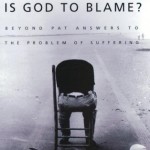We run our website the way we wished the whole internet worked: we provide high quality original content with no ads. We are funded solely by your direct support. Please consider supporting this project.
What are the main principles of the warfare worldview?
In my book God At War (IVP, 1997) I flesh out what I call the “warfare worldview” of the Bible. This is the view that the world is a battle ground between God and good angels, on the one hand, and Satan and fallen angels, on the other. In my book Satan and the Problem of Evil (IVP, 2001) I try to give a philosophical account of this battle. How is it possible for a world created by an all-good and all-powerful God to become a warzone between good and evil? I propose six theses which, if accepted, help explain this fact.
Love Requires Freedom: By definition, love must be freely chosen. We are able to program computers to obey our commands perfectly, but we don’t consider them “loving.” They lack the capacity for love because they have no choice but to do what we program them to do. Humans would be in the same category as computers if God merely “programmed” our actions. In order for creatures to be loving, they must have the freedom to do otherwise (to not love).
Freedom Implies Risk: The freedom to choose or reject love constitutes a risk for God. Creatures may make choices that oppose his will for their lives and the lives of others. This risk is illustrated throughout Scripture, beginning with the Garden of Eden. Many of us have experienced the painful consequences of misused freedom in our own lives. God considered love to be well worth the risk inherent in giving his creatures freedom.
Risk Entails Moral Responsibility: God’s creatures are held responsible for how they use their freedom. We don’t hold computers responsible when they fail because their failure is ultimately the responsibility of their programmers. They could not do other than what they were programmed to do. Because we are free to choose or reject love, we can be held accountable for how our choices affect those around us.
Moral Responsibility is Proportionate to the Potential to Influence: The potential a creature has for love is proportionate to the creature’s potential for evil. The greater the creature’s potential for love, the greater risk their freedom entails, for they may choose to use their potential for evil instead. Greater potential also entails greater responsibility for how the potential is used.
Power to Influence is Irrevocable: Genuine freedom must be irrevocable. If it can be revoked, creatures cannot be held responsible for their use of it, nor can they fully realize their potential for love. Within the parameters of the freedom God gives creatures, God must tolerate evil. Since God is omnipotent, he is able to accomplish his will within these parameters without compromising his own integrity or limiting the potential of his creatures by revoking their freedom.
Power to Influence is Finite: God’s creatures are finite. Although their freedom cannot be revoked, it can be thought of as “probational.” The scope and duration of their freedom is conditioned by many variables and ultimately determined by God’s will. The warfare between God and creatures who choose to use their freedom for evil is not eternal. Christ will vanquish his enemies in the end and creatures will be free to fully participate in the triune love of God at last.
Category: Q&A
Tags: Q&A, Spiritual Warfare, Warfare Worldview
Topics: Spiritual Warfare, Cosmic Conflict
Related Reading

How do you respond to Romans 11:36?
“For from him [God] and through him and to him are all things.” Calvinists sometimes cite this doxology as evidence that Paul believed that every single event in world history was from, through and for God. In light of the fact that the verses leading up to this doxology address God’s genuine frustration with Israel’s…

Does your “dispositional” ontology avoid substantival categories?
Question: In Trinity and Process you argue against a “substantival” ontology and instead advocate a “relational,” “process” and/or “dispositional” ontology in which being, being-in-relation and being-in-process are one and the same. In your view, entity x is its relation to entity y (and all other relations) and is the disposition to interact with y (and…

Quotes to Chew On: Prayer and Finitude
“We pray as we live: in a sea of ambiguity. This is not because we are fallen but because we are finite. And we are inclined to forget we are finite. We ignore the ambiguity that accompanies our finitude, and thus we claim to know what we can’t know. We reduce the unfathomable complexity of…

What is the significance of Numbers 16:41–48?
The day following the Korah incident (see vs. 20–35), the Israelites rebelled against Moses again, this time because they blamed him for the death of those who were judged the day before (vs. 41). The Lord was very angry because of this and said to Moses and Aaron, “Get away from this congregation, so that…

How can you believe Matthew’s report about the Jewish cover up of the resurrection?
Question: In Matthew it’s reported that Jewish authorities tried to cover up the resurrection of Jesus by saying the disciples stole the body while the guards were sleeping. I don’t buy it. How would Matthew know about this story, since it was a secret conversation the authorities had with the guards? And how could they…

How do you respond to 1 Peter 1:1–2?
As I read it, I Pet 1:2 is the thematic statement for the whole chapter. As I will show in a moment, the rest of the chapter unpacks this statement, so the rest of the chapter should be used to interpret this statement. In the rest of the chapter we find that believers… * have…
